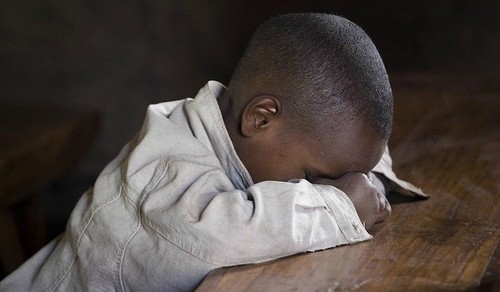We run our website the way we wished the whole internet worked: we provide high quality original content with no ads. We are funded solely by your direct support. Please consider supporting this project.

Does Prayer Really Change Things?
Many people operate out of a blueprint model where God is viewed as absolutely unchanging, and all that occurs in the world is the unfolding of an eternal divine plan. If this is the case, then the purpose of prayer is to change us, not to change things.
While prayer does change us, the Bible presents a perspective very different than the blueprint model. Prayer really does change things. Scripture teaches that God created a world in which he has significantly bound himself to the prayers of his people.
For instance, in Ezekiel 22:29-31, we see God responding to the sins of his people. He didn’t want to judge them and he sought for someone to prevent it. The Lord spoke as though there were a wall protecting his people from judgment, but the wall was being eroded by their sin. He sought someone to repair this wall and stand in the place where it was breaking so that the judgment wouldn’t come.
He was looking for someone to “stand in the breach” which refers to, or at least includes, intercessory prayer. After all, Scripture is full of examples of individuals and groups changing God’s plan to judge people through intercessory prayer (e.g., Num 11:1-2; 14:12-20; 16:20-35; Deut 9:13-14; 2 Sam 24: 17-25; Jer 26:19).
Let’s look at one example:
Therefore [the Lord] said he would destroy [the Israelites]—
had not Moses, his chosen one,
stood in the breach before him,
to turn away his wrath from destroying them. (Ps 106:23)
The prayer of Moses changed God’s plan (Ex 32:10-14). We need to take this teaching very seriously. In Exekiel 22, the Lord doesn’t say that prayer would have changed a person’s attitude about God’s judgment. The Lord says that prayer would have enabled God to withhold judgment. In light of this, it’s difficult to avoid concluding that God has sovereignly designed the world such that prayer significantly influences him and the world.
Jesus confirms this. He taught us to pray that his Father’s will would be done on earth as it is in heaven (Mt 6:10). The teaching only makes sense if God’s will is not already being accomplished on earth. Moreover, it only makes sense if our prayer actually helps bring about God’s will on earth. Prayer doesn’t just change our attitude toward God’s will: it releases it on the earth.
In addition, Jesus instructed us to ask God for things, promising us that they would be given (e.g., Mt 7:7; Jn 14:13-16). Prayer doesn’t just change our disposition about what we have or don’t have. It affects what we have or don’t have. Similarly, Jesus commanded us to pray with tireless persistence—as though God doesn’t want to hear and answer our prayer (Lk 11:5-13; 18:1-8). This teaching assumes that the more we pray, the more good is accomplished, not just in us but in the world. Indeed, Jesus taught that prayer can move mountains. It doesn’t just change our attitudes toward mountains!
—Adapted from Is God to Blame? pp. 126-128.
Image by babasteve via Flickr
Category: Q&A
Tags: Change, God, Open Theism, Prayer
Topics: Free Will and the Future, Hearing God, Prayer
Related Reading

Podcast: If Open Theism is True, Does it Make Sense to Pray For Intercession?
Greg talks about prayer and freedom. Specifically, if free will is so important, why would God override it in answer to prayer? http://traffic.libsyn.com/askgregboyd/Episode_0123.mp3

Reflecting on the Lord’s Prayer
Jesus begins the instruction on prayer (Matthew 6:9-13) by telling his disciples to pray for the Father’s name to be “hallowed,” for his kingdom to come, and for his will to be established on earth as it is in heaven. He is, in effect, telling them to pray for the fulfillment of everything his ministry,…

In light of Einstein’s conclusion that time is relative, how can you believe that God is not above time?
Relatively Theory basically stipulates that whether an event is viewed as being in the past, present or future depends on where one is in relation to the event in question as well as how fast one is moving. Some people conclude from this that Relativity Theory lends support to the classical view of God in…

To What Extent is the Future Open to Real Possibilities?
We frequently get questions about the extent to which the future is composed of actual possibilities rather than settled or determined. Here’s what Greg has to say in response to these questions: 1. We can be confident the future is settled, to the extent that the Bible depicts the future as settled. This, of course,…

What is the significance of Acts 27:10-44?
This is the passage deal with Paul’s ill-fated voyage to Italy as a prisoner. The ship ran into very bad weather and Paul announced, “Men, I can see that our voyage is going to be disastrous and bring great loss to ship and cargo, and to our own lives also” (vs. 10). As he reminded…

Roger Olson’s Review of The Cosmic Dance
Today we wanted to share a review of The Cosmic Dance by esteemed theologian Roger Olson. You can check out an excerpt below or you can read the whole review here. You can place an order for The Cosmic Dance here. The Cosmic Dance is Greg’s (and friends’) attempt to present the case that the best contemporary science supports viewing…
